| Support independent journalism |
| |
|
| 
|  | | | First Thing: Trump administration revokes Harvard’s ability to enroll international students | | | Move is most severe escalation yet in weeks-long dispute with the university. Plus, Trump seeks to end basic rights for child immigrants in custody | | 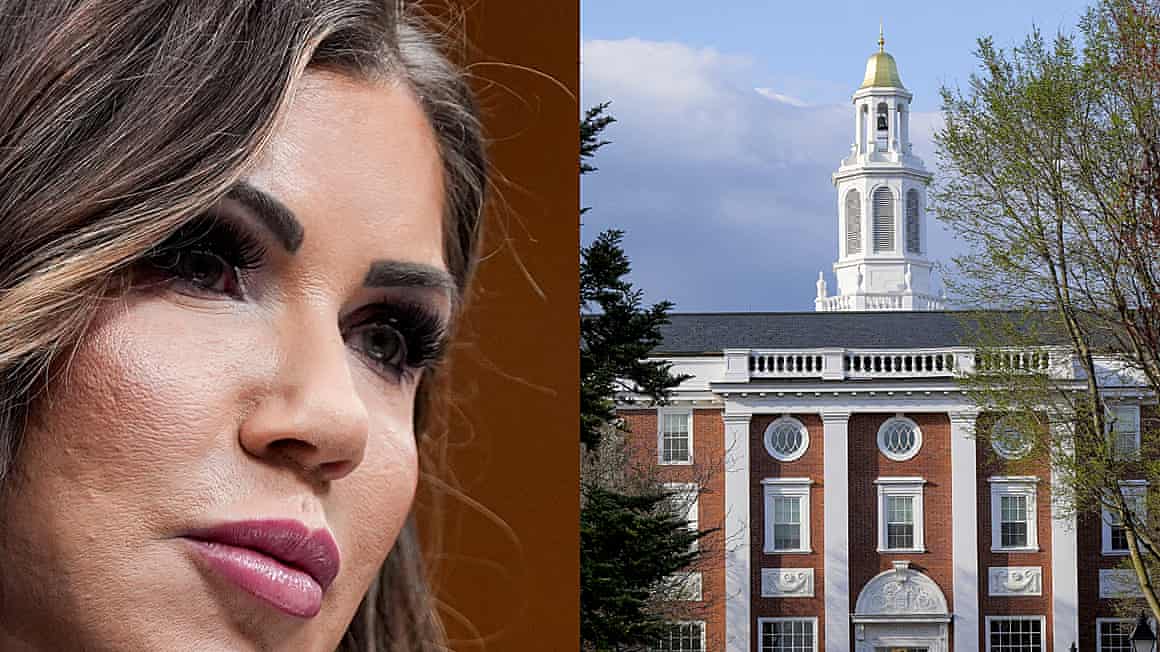 |  Kristi Noem, the homeland security secretary, posted the letter on X. Composite: AP/Reuters
| | Clea Skopeliti
| | | Good morning. The Trump administration has revoked Harvard University’s ability to register international students and has ordered current foreign Harvard students to transfer or lose their legal status, sending shockwaves through academia. The Trump administration notified Harvard of its decision after correspondence regarding the “legality of a sprawling records request” – part of a government investigation in which federal officials are threatening the university’s international student admissions. The homeland security secretary, Kristi Noem, said her department was taking the action owing to Harvard’s “failure to comply” with reporting requirements, adding that the Trump administration will “root out the evils of anti-Americanism and antisemitism in society and campuses”, coming amid the administration’s claims that Harvard has inadequately responded to antisemitism on campus. Trump seeks to end basic rights for child immigrants in custody | | |  |  Detained children line up at a residential centre in Karnes City, Texas. Photograph: Eric Gay/AP
| | | | The Trump administration is pushing to abolish a requirement stipulating the US government’s responsibility to provide basic rights and protections to child immigrants in its custody. The protections, which come from a 1997 consent decree called the Flores Settlement Agreement, cap the length of time children can be held by immigration authorities and require the government to provide detained children with adequate food, water and clean clothes. The administration’s attempt to end these protections echo Trump’s previous effort during his first term, though the motion was struck down. -
What is the justice department’s argument? It argued in a court motion on Thursday that the Flores agreement should be “completely” terminated, claiming it has encouraged unauthorised border crossings and stopped the government from “effectively” deporting immigrant families. Rights groups called it “unconscionable”.
Trump’s evidence of South Africa ‘white genocide’ contains images from Democratic Republic of Congo | | | 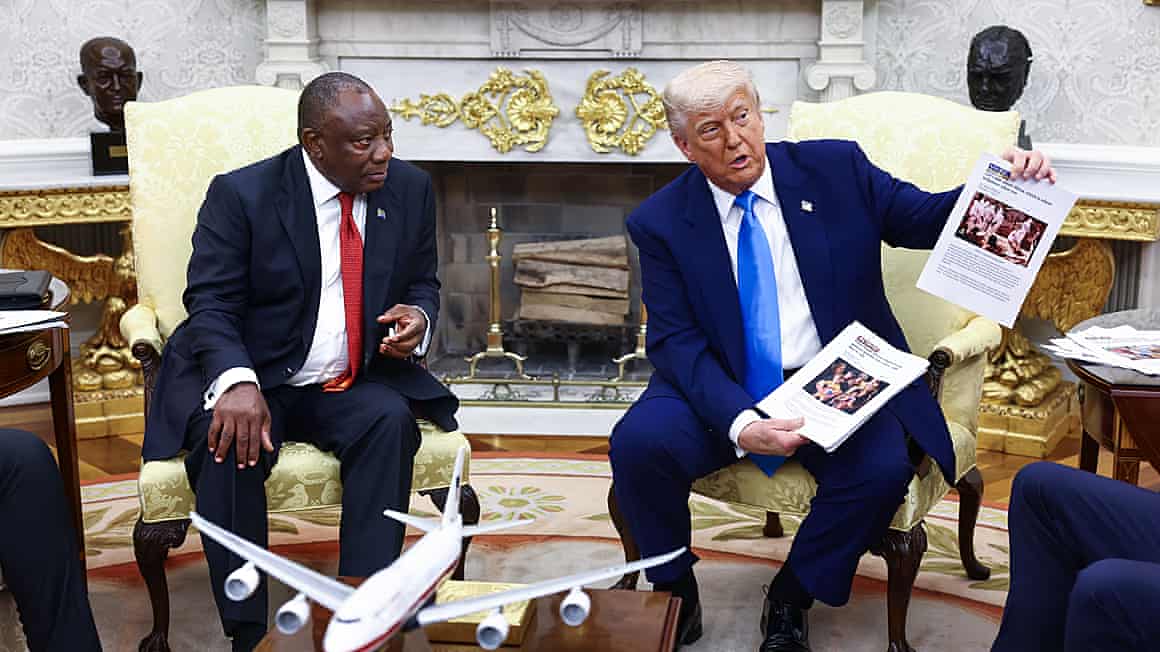 |  The South African president, Cyril Ramaphosa, is confronted with supposed evidence of genocide by Donald Trump. Photograph: Jim Lo Scalzo/UPI/Shutterstock
| | | | Evidence presented by Donald Trump to the South African president, Cyril Ramaphosa, to back up his false claims of a “white genocide” supposedly occurring in his nation included images from the Democratic Republic of Congo. Rather than depicting dead Afrikaners in South Africa, the images show humanitarian workers carrying body bags in the Congolese city of Goma after battles with Rwanda-backed M23 rebels. As well as photos taken in a different country, Trump showed Ramaphosa footage that he claimed depicting the “burial sites” of more than a thousand white farmers. Yet, it soon emerged that this was also inaccurate, as it turned out that it showed a temporary memorial site, set up after the murder of two Afrikaner farmers locally. -
What’s the context for Trump’s claims? While murder and violent crime rates are high in South Africa, the idea of a genocide against white South Africans is a far-right conspiracy theory: the majority of victims are Black, as Ramaphosa pointed out.
In other news … | | | 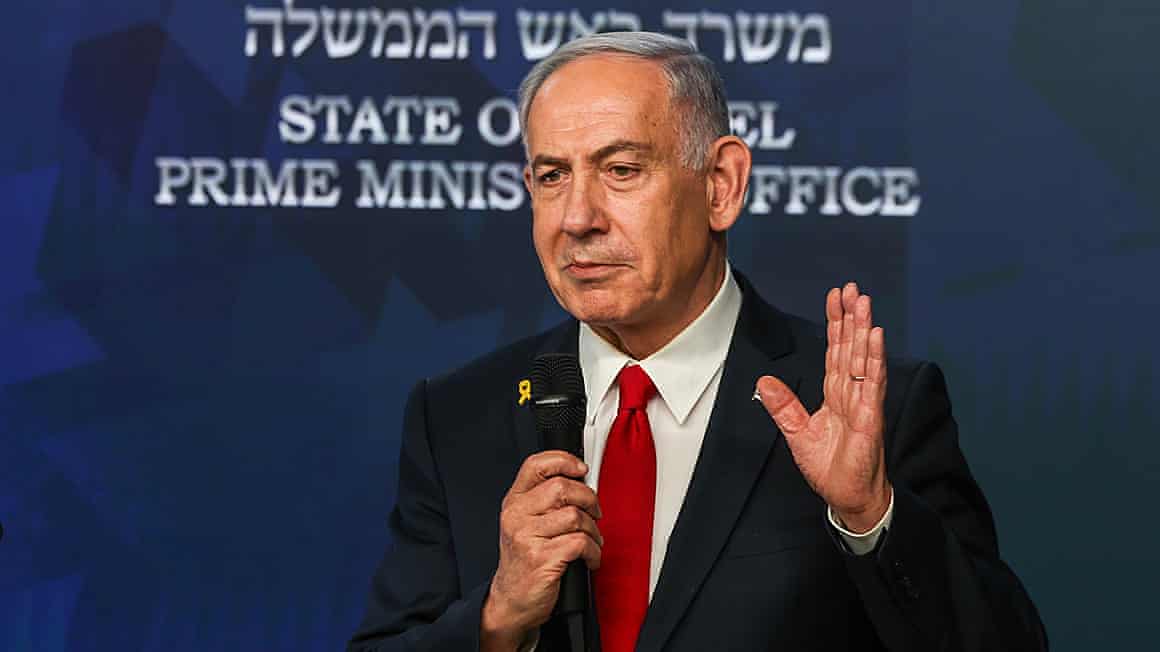 |  Benjamin Netanyahu said the remarks by Starmer, Macron and Carney were not ‘advancing peace’. Photograph: Ronen Zvulun/AP
| | | -
Israel has accused Canada, the UK and France of “emboldening Hamas”, after the country’s leaders called on Israel to stop its military offensive and allow humanitarian aid to enter Gaza. -
Venezuela’s decision to hold elections to choose officials to run an area of internationally recognised Guyanese territory is an assault on the country’s sovereignty, Guyana’s president has warned. -
Columbia graduate and detained Palestinian activist Mahmoud Khalil was finally allowed to hold his baby for the first time, one month after he was born.
Stat of the day: Number of internally displaced people hits record 83.4m | | | 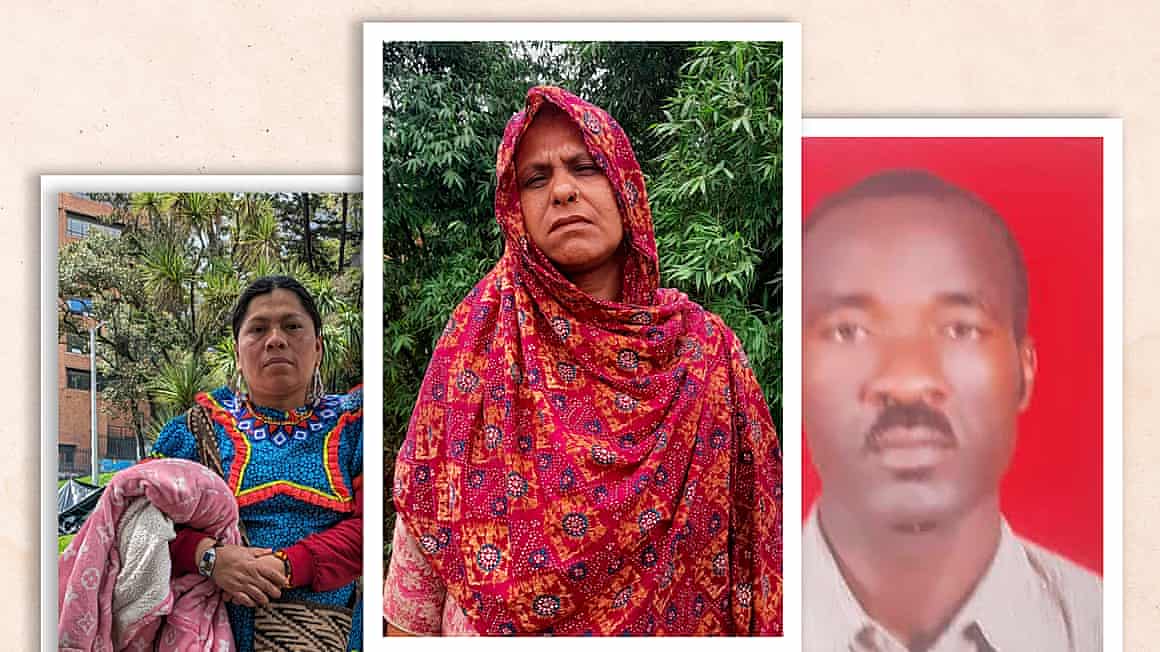 |  From left to right: Rosmira Campos, Baby Begum and Mubarak Ibrahim. Photograph: Thaslima Begum/The Guardian
| | | | Conflict, violence, the climate emergency and natural disasters, have forced a record 83.4 million people to become refugees within their own nations. Three internally displaced people in Bangladesh, Sudan and Colombia explain how floods, civil war and clashes between the military and paramilitary groups forced them to flee their homes. “Local people don’t want us here … We don’t want to be here either – but we have no choice,” said a woman with four children living in a tent in a Bogotá park. Don’t miss this: Fear, hope and loathing in Elon Musk’s new city | | | 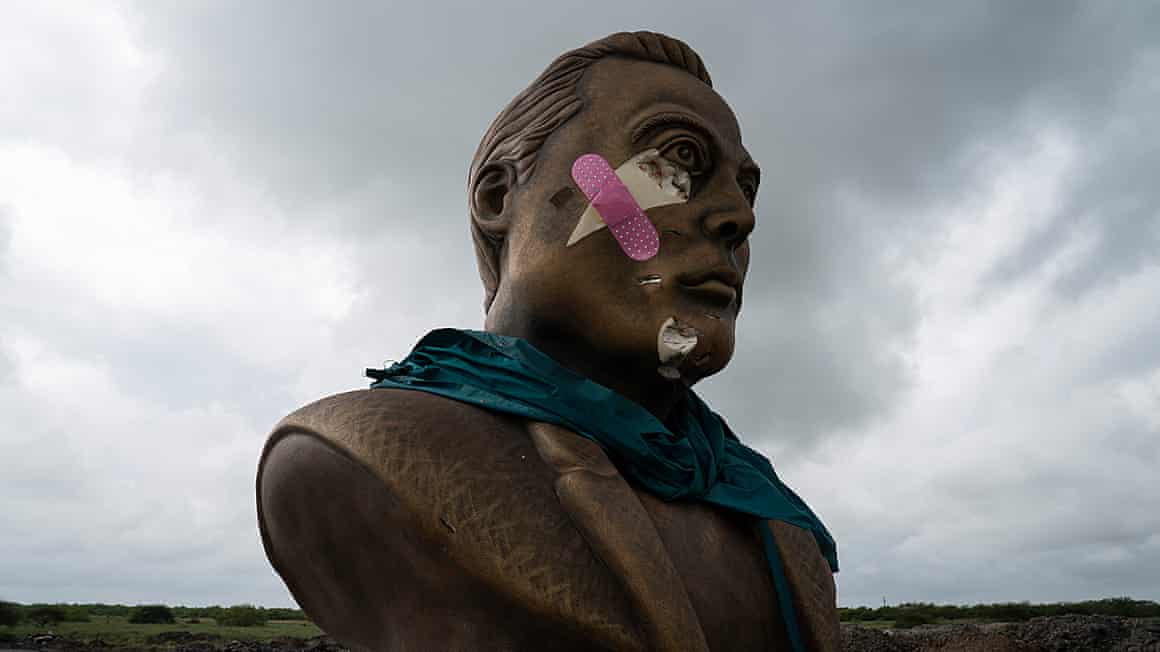 |  A bust of Elon Musk near his Starbase facility in Brownsville, Texas has been defaced. Photograph: Gabriel Cardenas/AFP/Getty Images
| | | | In Cameron county, on the southern tip of Texas, the world’s richest man has built Starbase, the home of his mission to “save’ humanity and colonise Mars, complete with a bronze bust in his own image. But as its population of 280 – most employed by Musk – prepared to vote on whether to incorporate it as a new municipality, others living near the base were divided over the billionaire and his plans. Climate check: Is legal action the only way to save the planet? – podcast | | |  |  A growing number of lawyers are using the courts to make governments around the world take action. Photograph: Minden Pictures/Alamy
| | | | Prosecuting polluters over climate harms is notoriously tricky – a huge number of actors are behind emissions, making it hard to establish legal responsibility, and the worst harms are often not experienced in the same country that the emissions are produced in. But in recent years, judges have woken up to the existential threat of the climate emergency and have begun to allow the interpretation of human rights law to shift to accommodate that. Samira Shackle speaks to some of the pioneers of this change and asks what the impact could be. Last Thing: WTF? Americans and Britons swear more than Australians online | | | 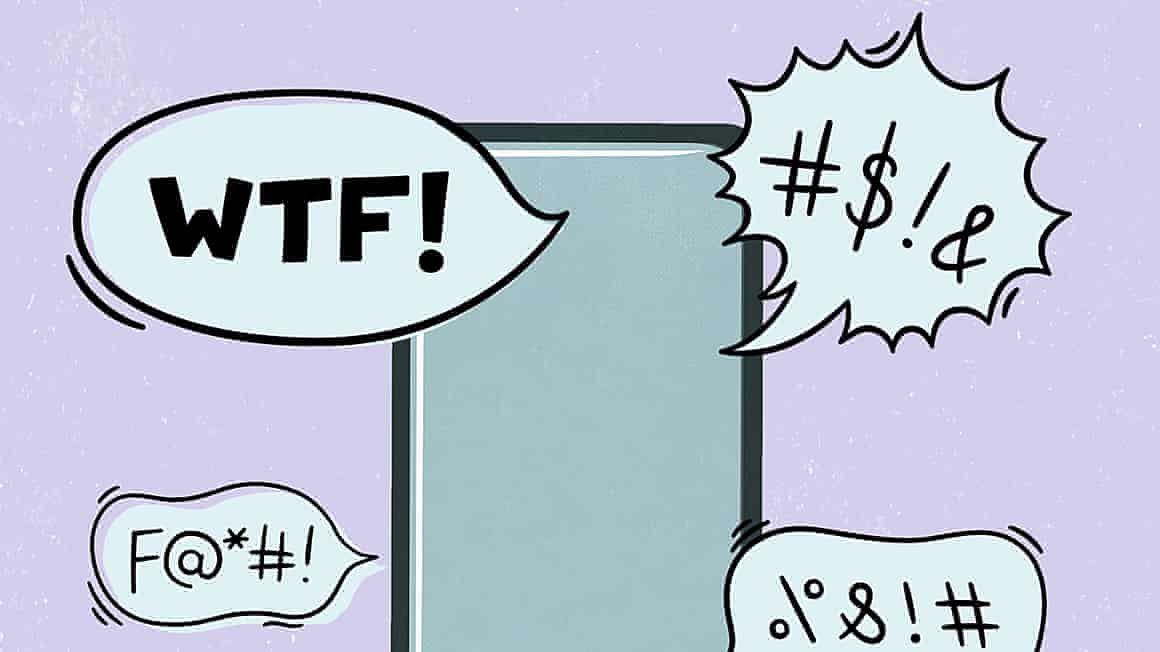 |  Researchers say Australians swear less than potty-mouthed Poms and vulgar Americans – online, at least. Composite: Victoria Hart/Getty images
| | | | Americans come first and British people second when it comes to how often they swear online, while Australians are in third place, vital new research has found. But while people from the US and UK are ahead in terms of sheer volume of curse words used, Australians were more likely to use uncommon and unique swears, with the researchers noting that vulgar language is a “natural playground” for unleashing “linguistic creativity”. Sign up | | | | | | First Thing is delivered to thousands of inboxes every weekday. If you’re not already signed up, subscribe now. Get in touch If you have any questions or comments about any of our newsletters please email newsletters@theguardian.com | |
| | | Betsy Reed | | Editor, Guardian US |
|  |
| | I hope you appreciated this newsletter. Before you move on, I wanted to ask whether you could support the Guardian’s journalism as we face the unprecedented challenges of covering the second Trump administration.
As Trump himself observed: “The first term, everybody was fighting me. In this term, everybody wants to be my friend.”
He’s not entirely wrong. All around us, media organizations have begun to capitulate. First, two news outlets pulled election endorsements at the behest of their billionaire owners. Next, prominent reporters bent the knee at Mar-a-Lago. And then a major network – ABC News – rolled over in response to Trump’s legal challenges and agreed to a $16m million settlement in his favor.
The Guardian is clear: we have no interest in being Donald Trump’s – or any politician’s – friend. Our allegiance as independent journalists is not to those in power but to the public.
How are we able to stand firm in the face of intimidation and threats? As journalists say: follow the money. The Guardian has neither a self-interested billionaire owner nor profit-seeking corporate henchmen pressuring us to appease the rich and powerful. We are funded by our readers and owned by the Scott Trust – whose only financial obligation is to preserve our journalistic mission in perpetuity.
With the new administration boasting about its desire to punish journalists, and Trump and his allies already pursuing lawsuits against newspapers whose stories they don’t like, it has never been more urgent, or more perilous, to pursue fair, accurate reporting. Can you support the Guardian today?
We value whatever you can spare, but a recurring contribution makes the most impact, enabling greater investment in our most crucial, fearless journalism. As our thanks to you, we can offer you some great benefits. We’ve made it very quick to set up, so we hope you’ll consider it. | | However you choose to support us: thank you for helping protect the free press. Whatever happens in the coming months and years, you can rely on the Guardian never to bow down to power, nor back down from truth. | | |
|
|
| | |
| 
| Manage your emails | Unsubscribe | Trouble viewing? | | You are receiving this email because you are a subscriber to First Thing: the US morning briefing. Guardian News & Media Limited - a member of Guardian Media Group PLC. Registered Office: Kings Place, 90 York Way, London, N1 9GU. Registered in England No. 908396 |
|
|
|
|
|